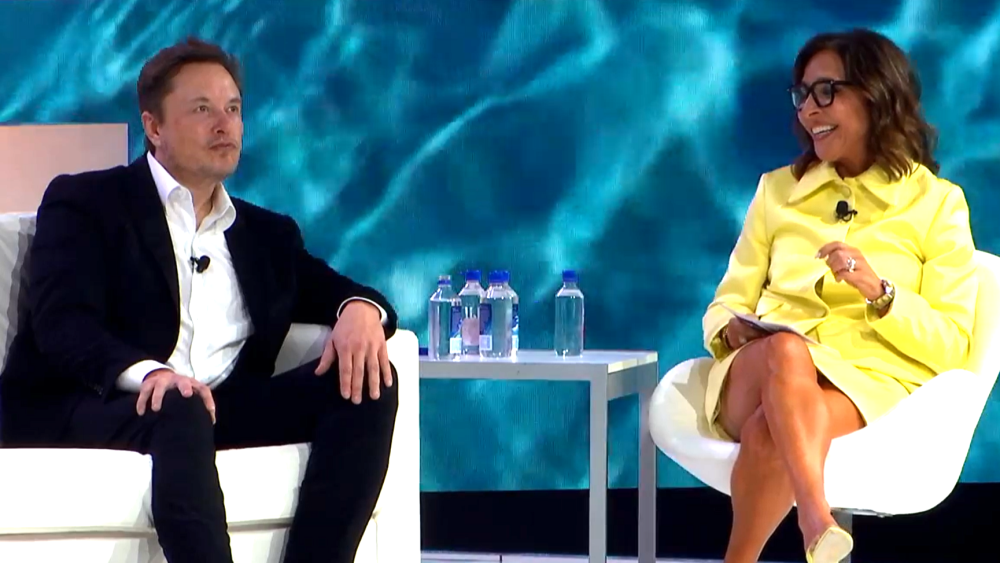
In what may have been an highly unconventional job interview, NBCUniversal ad chief Linda Yaccarino hosted a discussion with Elon Musk about Twitter’s content policies and approach to working with marketers at an industry conference one month before Musk announced that he’d hired her as the social network’s CEO.
The April 18 keynote conversation was billed as a talk about Musk’s “Twitter 2.0: From Conversations to Partnerships” at MMA Global’s Possible marketing event in Miami.
Yaccarino told Musk that marketers want “protection for their ad campaigns,” with content moderation policies ensuring that “provocative speech” is properly labeled. She applauded Twitter’s announcement last month to promote “freedom of speech, not freedom of reach,” under which the company said it will limit the reach of tweets that violate policies concerning hateful conduct and violent speech.
“Have you de-risked the opportunity or chance of their campaigns landing in these awful, hateful places?” Yaccarino asked.
Musk said Twitter has implemented “adjacency controls” that let marketers block ads from appearing next to “anything that is remotely negative.” Apple and Disney have both remained major Twitter advertisers, according to Musk. The company’s brand-safety initiative is working, he claimed, otherwise “Disney would have pulled their ads [from Twitter] a long time ago and haven’t.”
Musk pushed back on Yaccarino’s suggestion that advertisers should be able to influence what Twitter is building. “If I were to say, ‘Yes, you can influence me’ — that would be wrong. That would be very wrong,” he said.
Yaccarino clarified that she was referring to “an open feedback loop for advertising experts” to help “develop Twitter into a place where they will be excited” about spending more ad dollars. Musk responded, “It’s totally cool to say that you want to have your advertising appear in certain places in Twitter and not other places. But it is not cool to try to say what Twitter will do. And if that means losing advertising dollars, we lose it. But freedom of speech is paramount.”
Yaccarino asked if Musk would reinstate Twitter’s “influence council,” which convened top advertisers to provide recommendations to the company. Musk said he was open to feedback but appeared to rule out establishing such a council. “I would be worried about creating a backlash among the public. Because if the public thinks that their views are being determined by a small number of [ad executives] in America, they will be, I think, upset about that,” he said.
At another point, Yaccarino alluded to Musk’s controversial comments (and urged him to stop tweeting after 3 a.m., which he pledged to strive to do). “I have to push you a little, because there’s a lot of folks in this room, they vote with their pocketbooks… but they can’t cross that transom. They have a challenge with your points of view, your opinions, and [they’re] still holding back from unlocking the full power of Twitter,” Yaccarino said.
Musk blamed “negative amplification in the media” for how some of his remarks have been portrayed, and he also criticized “traditional media” (which he claimed competes with Twitter for ad dollars) for perpetuating the notion that hate speech is rampant on Twitter.
Yaccarino questioned Musk about whether, as the owner of Twitter (and the most-followed individual on the platform), he should “be held to a different or higher standard.” She also pointedly asked whether Musk’s own tweets could be labeled as hate speech under Twitter’s “awful but not unlawful” approach. According to Musk, his tweets are in fact subject to Twitter’s content-labeling policies, as well as the platform’s Community Notes feature that uses crowdsourcing to fact-check content.
Earlier in the conversation, Musk said, “In order for civilization to advance, we’ve got to have freedom of speech,” prompting applause in the room. “It’s a bigger deal than you’d think.” The “acid test” for free speech, he continued, is, “Are people you don’t like allowed to say things you don’t like?”
Now that she is on Musk’s payroll, it will be interesting to see if Yaccarino changes her tune. After resigning from NBCU this week, Yaccarino is set to join Twitter (which is officially now called X Corp.) before the end of June. As CEO, she’ll be in charge of business operations including ad sales, while Musk said he will lead “product design & new technology” as CTO. Musk, of course, remains the owner of Twitter and singular decision-maker about the company’s strategy and operations.
On Friday, a Twitter commenter addressing Musk expressed alarm that Yaccarino, during the conference session in Miami, “was most excited about your initiative to limit reach of tweets which are deemed hateful” and fretted that she would be inclined to “pander” to advertisers that “push woke ideology on the world.” Musk replied, “I hear your concerns, but don’t judge too early. I am adamant about defending free speech, even if it means losing money.”
Meanwhile, one week before Yaccarino’s move to Twitter was revealed, NBCU announced content and ad deals with Twitter and Snapchat, with each company individually signing on to promote the media company’s Paris 2024 Summer Olympics and Paralympic Games. The pact with Twitter is set to include an exclusive live show produced by NBC Olympics featuring highlights, athlete interviews and “interactive engagements to drive conversation amongst fans.”













